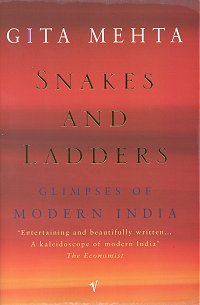Review: Snakes and Ladders

- Title
- Snakes and Ladders: Glimpses of Modern India
- Author
- Gita Mehta
- Publisher
- Vintage, London, 1998
- ISBN
- 0-09-926822-1
Review Copyright © 1998 Garret Wilson — November 3, 1998, 6:30pm
In some ways, the collection of short stories has become a trend in post-colonial Indian literature. Mistry had his Firozsha Baag and Rushdie expounded about East and West. In Snakes and Ladders, Gita Mehta gives her variation on the theme, with a multitude of brief insights into real life in India.
This is not to say, however, that Snakes and Ladders is just another collection of writings about India. While Rushdie may simply use India as a setting to demonstrate his literary prowess, or Mistry may create a scene so vivid you may think that you’re actually visiting India, Mehta takes another tact. Her latest work is not so much a collection of short stories as a collection of essays, some only a couple of pages in length, which simply tells you what Gita Mehta thinks about India. She does this in such a way that you’re no longer a visitor — you feel as you’ve been born in, raised in, left, and returned to India. Indeed, such is the strength of the work that, by the time you have finished the book, you will feel homesick for India — wherever your true home may be.
There is much, much to be said in favor of Snakes and Ladders. First, of all each essay is so short and engrossing that time is quickly forgotten. There should be no excuse not to immediately enter Mehta’s world; all that is required is the slightest knowledge of Indian history. With that precondition satisfied, you can read the book anywhere, anytime: before bed, in the Wendy’s by King’s Cross station, in the Underground going to Russell Square (minding the gap, of course), or even on the train back from Southall. The beauty of smallness is that it doesn’t take a lot of time to get into the story, and if you can’t read for long, you don’t feel as if you must start all over again the next time.
The name of the book is taken from the board game of Snakes and Ladders which apparently originated in India. You won’t completely understand exactly how appropriate this title is until you’ve either studied Indian politics, examined Indian economic policies, or you’ve read this book. In the game, a player can land on a ladder and quickly advance in the game, or land on a snake and immediately be set back. Such is India itself.
Mistry’s fiction work, A Fine Balance, did an excellent job of explaining this feature of Indian life. Snakes and Ladders lets you know that there’s no need to think only in terms of fiction. The rules of the game seem to be set firmly against the player — even the government simply suspends the rules when things are not going its way, and Mehta remembers attending a demonstration against such actions out of curiosity as a girl:
Under the circumstances I had little option but to agree to be escorted from the park by eight men, linking arms to make way for me through the crowd. A few minutes later the firing began. In the years that followed there would be other demonstrations when state governments were dismissed, but the police would no longer hold there fire until the women and children had left (109).
In 1975 Indira Gandhi declares a state of emergency, which "ended democracy in India" (127). A snake. Later, when she felt that public opinion was warming, she called elections to be quickly held. But against the odds others campaigned against here: Sikhs, Muslims, and Hindus shared the stages as they spoke for a change in government. A ladder.
But the game wasn’t over. Things don’t go well, Mrs. Gandhi is back in power, Mrs. Gandhi is killed by her bodyguards, and then the Sikhs, Muslims, and Hindus who were once working together are again scrambling to kill each other. Ladders and snakes. Snakes and ladders. And the game goes on.
Reading Snakes and Ladders is like taking a train ride through time and space. Each short essay is a window through which you experience a small bit of being Indian. You may not always agree with Mehta, and you may think some of her ideas (is she an economist, too?) possibly naive, but you’ll definitely feel like laughing, sometimes like crying. You’ll be ashamed to think that such things could happen there. Even if you’ve never been. And you’ll feel proud to be Indian. Even if you’re not.
Copyright © 1998 Garret Wilson